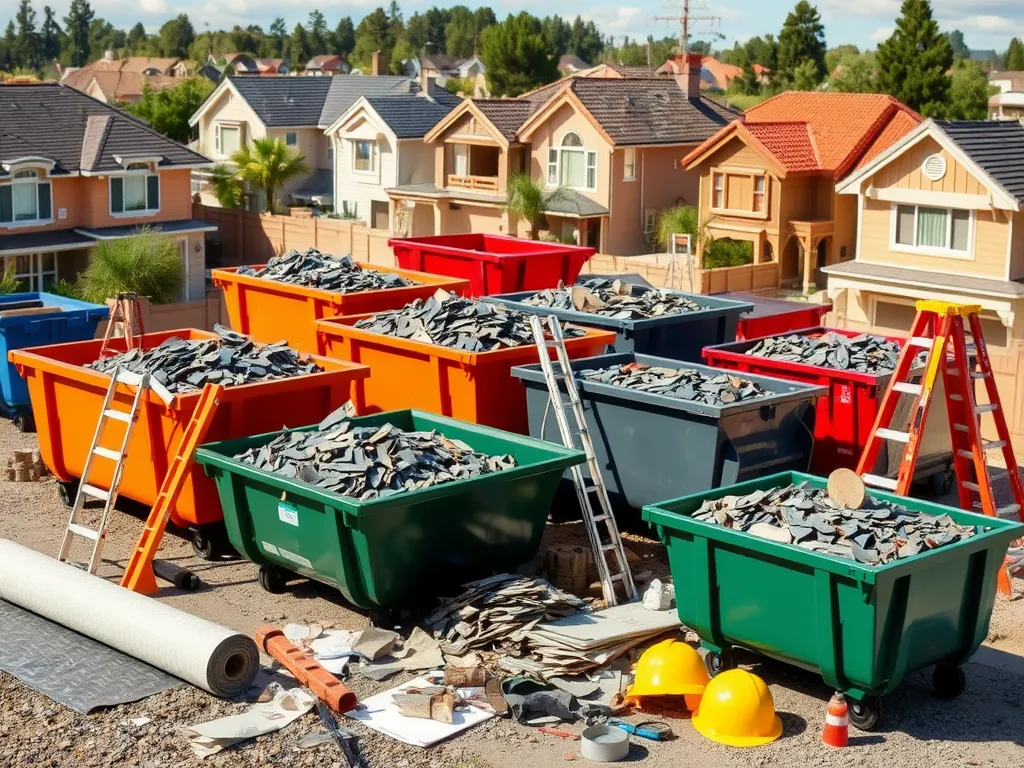Everything You Need to Know About Dumpster Rental Roofing

The Ultimate Guide to Dumpster Rental for Roofing Projects
Dumpster rental roofing is an essential service that caters specifically to roofing contractors and homeowners who are undertaking roofing renovations or replacements. When removing old roofing materials, it’s crucial to have a designated space to dispose of the debris safely and efficiently. Instead of leaving waste scattered around the site, renting a dumpster provides a straightforward solution that minimizes safety hazards and promotes efficient project timelines.
For those involved in construction, understanding the protocols of https://ehs.stanford.edu/topic/construction-maintenance/hazardous-materials-handling-and-disposal is crucial for workplace safety.
Renting a dumpster for roofing tasks not only helps in managing waste but is also a cost-effective choice for disposing of materials like shingles, underlayment, and other debris. Many companies offer various sizes of dumpsters, allowing you to select one that best fits your project’s needs. Understanding the specifics of dumpster rental roofing can save time and money while ensuring compliance with local disposal regulations.
Whether you're a seasoned roofer or a DIY enthusiast, knowing how to navigate dumpster rental roofing is essential for any roofing job. Proper planning, considering weight limits, and adhering to safety regulations are paramount when dealing with construction debris. By understanding the details of this service, you can ensure the smooth execution of your roofing project while keeping your environment safe and clean.
Moreover, with increasing awareness about environmental impact, many dumpster rental services are now focusing on sustainable practices. This includes recycling roofing materials and proper disposal methods that meet the regulations governing landfills. Therefore, having the knowledge about dumpster rental roofing not only makes your project easier but also contributes positively to environmental conservation.
In conclusion, dumpster rental roofing is not just about renting a container for waste. It involves strategic planning regarding size, costs, best practices, and environmental considerations. This guide aims to cover all aspects of dumpster rental roofing and help you make informed decisions for your next roofing project.
Choosing the Right Dumpster Size for Roofing
When renting a dumpster for roofing, it's critical to choose the right size. Dumpsters typically come in various sizes measured in cubic yards, including 10, 20, 30, and 40-yard options. Understanding your project's scale and the amount of debris generated will help you determine what size is appropriate. Oversized dumpsters may incur extra fees, while undersized ones can leave you with excess waste.
To calculate the volume of roofing materials you'll need to dispose of, consider the area of your roof and the type of materials being removed. For instance, a standard asphalt shingle roof may yield approximately 3-4 tons of debris per 1,000 square feet. Having a rough estimate of the waste can guide your dumpster size choice, thereby preventing excess fees and ensuring efficient waste management.
Common dumpster sizes for residential roofing projects include 10-yard, 20-yard, and 30-yard dumpsters. A 10-yard dumpster accommodates small jobs, while a 20-yard dumpster is ideal for larger roofing projects involving more debris. For extensive roofing renovations, a 30-yard dumpster may be necessary to handle the waste effectively.
If you’re concerned about underestimating the size, consider renting a slightly larger dumpster or inquire about the option for additional space. It’s better to overestimate than risk delays and additional costs associated with a second dumpster delivery.
Cost Factors in Dumpster Rental for Roofing
The average cost of renting a dumpster for roofing projects varies widely based on size, rental duration, and location. Typically, rates can range from $300 to $600 for a standard rental period of 7-10 days. However, additional factors such as the weight of the materials, any additional days, and extra fees can influence overall costs.
Be aware that many dumpster rental services impose hidden fees, particularly for exceeding weight limits or for disposal of prohibited materials. Always read the fine print in your rental agreement and ask the provider about potential extra costs to avoid surprises when it’s time to settle the bill.
To reduce costs for your roofing project, consider shopping around and getting several quotes from different dumpster rental companies. Look for package deals or discounts for longer rental periods, and be mindful of recycling options that could lower disposal fees. Proper planning and budgeting can result in substantial savings.
Additionally, the location of your project can significantly affect pricing. Areas with higher disposal costs or limited local landfill options may see higher dumpster rental fees. It’s advisable to direct your inquiries to rental companies that operate specifically within your area for better pricing information.
Best Practices for Using a Dumpster for Roofing
Loading techniques play a critical role in the safe and efficient use of a dumpster for roofing projects. Always load heavy materials first, distributing the weight evenly to avoid creating an unstable load. For safety, avoid overfilling the dumpster, as this can lead to dangerous debris spill during transport.
Most rental dumpsters have weight limits that should be strictly adhered to. Exceeding the limit can lead to significant additional charges and possible damage during transit. Be sure to clarify the weight limits with your rental provider and have a rough estimate of your roofing materials to prevent overages.
Proper scheduling of delivery and pickup is also essential in maintaining your project schedule. Coordinate with the rental company to ensure the dumpster is delivered before the roofing work begins, and schedule the pickup as soon as the project is completed. This prevents clutter on the worksite and keeps your project timeline on track.
Lastly, always ensure compliance with local regulations regarding dumpster placement and waste disposal. Many municipalities have specific laws governing where dumpsters can be placed and how long they can remain on a job site. Checking local guidelines or obtaining permits as required can keep your project running smoothly without fines or delays.
Comparing Dumpster Rental Companies for Roofing
When comparing dumpster rental companies, it’s important to ask key questions to narrow down your options. Inquire about their available sizes, rental terms, and what materials are permitted within the dumpster. Ensuring that the rental company understands the unique needs of roofing projects is vital for a successful experience.
Reading customer reviews can provide insight into the quality of service provided by rental companies. Look for feedback regarding timely delivery, customer support, and any issues with hidden fees to make an informed decision based on other customers’ experiences.
Assessing the service quality of a dumpster rental company includes evaluating their responsiveness to inquiries and their willingness to accommodate special requests, such as last-minute rentals or changes in pickup schedules. Good communication is a strong indicator of their reliability.
Understanding rental agreements thoroughly before signing is crucial. Review conditions regarding damage to the dumpster, cleaning responsibilities, and what happens if you exceed the rental period. A well-understood agreement can prevent misunderstandings or costly disputes later on.
Environmental Considerations in Dumpster Rental
Recycling roofing materials is an important aspect of environmental sustainability in dumpster rental roofing. Many companies facilitate the recycling of shingles and other materials to prevent them from ending up in landfills. This not only helps the environment but can also lower disposal costs.
Using safe disposal methods helps protect the environment from hazardous materials found in some roofing products. Ensure that your dumpster rental company complies with local regulations surrounding disposal practices, particularly when dealing with materials that may contain toxins or pollutants.
Choosing eco-friendly dumpster services can enhance your project's sustainability. Many companies now offer green options that prioritize recycling and eco-conscious management of the waste generated from roofing projects. These services often use sustainable practices that minimize the environmental impact.
Understanding landfill regulations is fundamental for any remodeling project, especially roofing. Local laws may dictate what substances can be disposed of in landfills and what materials need special handling. Ensure your dumpster rental experience aligns with regulatory requirements to avoid legal issues and contribute positively to community recycling efforts.
